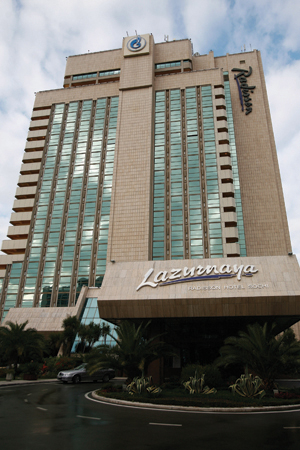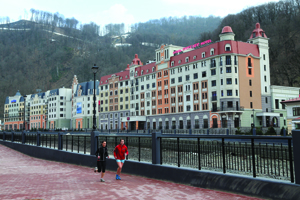It’s 10 months before the Sochi Games, and USA Hockey Executive Director Dave Ogrean is worried. His organization still hasn’t secured hotel rooms for the 2014 Winter Olympics — and his national governing body isn’t alone.
None of the eight U.S. winter national governing bodies has finalized its accommodation plans for Sochi. Executives at each one said that wasn’t the case at this point ahead of the 2010 Vancouver Games or the 2006 Torino Games. The situation, which also extends to their sponsors and some Team USA sponsors, has them concerned.
“We’re not close at all,” said Ogrean, who needs at least 20 rooms for staff and board members during the Games. “It may not be until summer until we get something worked out.”
U.S. Figure Skating’s chief marketer, Ramsey Baker, said his organization has finalized some hotels but that it is having a hard time helping the families of its athletes secure accommodations.
 |
Sochi is still largely under construction, including new hotel rooms. Existing hotels like the Radisson (above) are booking up.
Photo by: GETTY IMAGES (2)
|
“In Vancouver, people were able to figure it out on their own,” Baker said. “In Sochi, they can’t figure it out.”
Hospitality experts said there are a variety of factors in play for the Sochi Games that have made securing hotel rooms difficult. The Sochi Games mark the first time in more than two decades that the International Olympic Committee has taken a Winter Olympics to an undeveloped market. Lillehammer (1994), Nagano (1998), Salt Lake City (2002), Turin (2006) and Vancouver (2010) all had an existing infrastructure that was able to accommodate many of the more than 40,000 guests that travel to a Winter Games.
But Sochi is still largely under construction. The region didn’t have an existing hotel infrastructure, and many of the needed new hotels are still being built. Between 2012 and 2018, the number of hotel rooms provided by international hotel chains ranging from Hyatt to Marriott to Capella is expected to rise from nearly 22,000 rooms to 47,000 rooms.
Additionally, construction on some of those planned hotels has been halted, said Raffaella Cinti, who is based in Sochi and working on behalf of the Olympic hospitality agency Ludus Tours, which is assisting USA Luge with its accommodations in Russia. The decision to halt construction has made agencies like Ludus uncomfortable booking hotels that aren’t finished.
“As a buyer of rooms, I don’t feel comfortable getting a hotel that might not be finished,” Cinti said. “Right now, there are eight buildings that were supposed to be finished and be hotels, but the government stopped the work. We’re not sure if they will start again.”
Further complicating matters is the fact that many of the rooms at new hotels are being held by Sochi Olympic organizers for official Olympic sponsors and IOC officials. SportsMark CEO Steve Skubic said he experienced the complications that can come from that practice firsthand when he visited last month for Olympic test events. The group was supposed to be just four people, and SportsMark reserved four rooms at a Radisson near the ski resort of Rosa Khutor. Two weeks later, four other people decided to join the trip, and they called to reserve rooms, but there were none available at the Radisson. A week or so before they departed, they got a call from the Radisson, offering rooms that had become available.
“What’s happening is that you have the organizing committee holding all these rooms until they know what they need, and then they’re released,” said Skubic, whose agency works with Visa, Procter & Gamble and other Olympic sponsors. “The same thing could be happening for the Olympics, as well. They could be waiting to be sure they have enough rooms for the Olympic family and sponsors, and then they will release them.”
The other problem NGBs and hospitality agencies are running into is that there are few Western-style options outside the new hotels. Sochi is littered with what are known locally as mini hotels, two- or three-star local establishments that have just a handful of rooms and limited services. Many don’t have a reception area, lounge or restaurant, and most aren’t accustomed to Western expectations of lodging services.
Pricing for those hotels is an issue, as well. Cinti said that she’s staying in one now that has no reception area, no lounge and no restaurant. She compared it to an apartment — and said that the property is charging $450 a night during the Olympics and is requiring people to reserve it for 30 days. That translates to a total cost of more than $13,000.
“To me, that’s a lot,” Cinti said. “The prices aren’t higher [than past Olympics], but it’s just you won’t get the same experience.”
Reserving rooms for the entire month of the Games is unrealistic for many NGBs and the families of Team USA members. Usually, NGB executives and families of athletes go to the Games around the time of their competition. In the case of luge, that’s just the first week of the Sochi Games. In the case of US Biathlon, that’s approximately 18 days. By booking rooms during just the time they need to be there, they could save thousands of dollars per room, which is significant for these nonprofit organizations.
“We’ve gotten a price, but we’re not happy with it,” said US Biathlon CEO Max Cobb, who said his group was quoted $750 a night for a 30-night minimum. “We just want to find a little more value-oriented package.”
U.S. Figure Skating is trying to alleviate some of the cost for families traveling to Sochi by creating a donor program to underwrite travel costs. The initiative, which is called the Family Tree Program, allows donors to purchase “a leaf” for $20.14. The money raised will go to offsetting travel costs for families of Team USA members. Three people have made $5,000 grants, and Puffs, a figure skating sponsor, matched one $50 gift in January with a $450 donation.
“We looked at it and realized Sochi was different than Vancouver and it won’t be as easy,” Baker said. “The amount of housing available isn’t present, and it will be expensive to fly to Sochi. Knowing that in the past it’s been a concern for athletes that their families can afford to go, we know that will be even more of a concern in Sochi.”
Tom Kelly, U.S. Ski & Snowboard Association vice president of communications, was one of the few NGB executives who said he wasn’t concerned about securing accommodations. The NGB began working on its room needs and planning for Sochi three years ago, and though it hasn’t finalized its housing plans, Kelly said it has three or four options in Krasnaya Polyana, which will host alpine events, and expects to have confirmation on multiple hotels and condominiums soon.
“We don’t have a concern, but we have a lot of work to do,” Kelly said. “We knew we would have a lot of work to do.”
The organization has made some changes to its hospitality plans for Sochi. In Turin and Vancouver, it rented space to host nightly medal celebrations. Kelly said it was difficult finding space to rent for comparable events in Sochi, so it will have a “mobile victory celebration” that will change each night based on where the organization makes dinner reservations.
“It’s a really different [host city], so you have to make adjustments,” Kelly said. “There’s no comparison to previous Games because there’s not a tourism infrastructure in place.”
Ogrean echoed that sentiment, saying that he’s sure USA Hockey and the other NGBs will secure rooms, but that it will take time.
“If you have a cast iron stove and patience,” he said, “it always works out, but it will be later this year than usual.”





